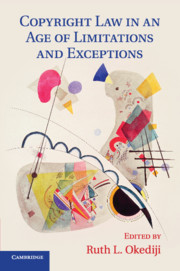Book contents
- Copyright Law in an Age of Limitations and Exceptions
- Copyright Law in an Age of Limitations and Exceptions
- Copyright page
- Dedication
- Contents
- Author Biographies
- Preface
- Introduction
- 1 Justifications for Copyright Limitations and Exceptions
- 2 The Role of the Author in Copyright*
- 3 A Few Observations about the State of Copyright Law
- 4 Fetishizing Copies
- 5 Copyright in a Digital Ecosystem
- 6 The Canadian Copyright Story
- 7 (When) Is Copyright Reform Possible?
- 8 Fair Use and Its Politics – at Home and Abroad
- 9 Flexible Copyright
- 10 The Limits of “Limitations and Exceptions” in Copyright Law
- 11 Lessons from CopyrightX
- 12 Rights on the Border: The Berne Convention and Neighbouring Rights
- 13 How Oracle Erred
- 14 Reframing International Copyright Limitations and Exceptions as Development Policy
- Index
3 - A Few Observations about the State of Copyright Law
Published online by Cambridge University Press: 07 June 2017
- Copyright Law in an Age of Limitations and Exceptions
- Copyright Law in an Age of Limitations and Exceptions
- Copyright page
- Dedication
- Contents
- Author Biographies
- Preface
- Introduction
- 1 Justifications for Copyright Limitations and Exceptions
- 2 The Role of the Author in Copyright*
- 3 A Few Observations about the State of Copyright Law
- 4 Fetishizing Copies
- 5 Copyright in a Digital Ecosystem
- 6 The Canadian Copyright Story
- 7 (When) Is Copyright Reform Possible?
- 8 Fair Use and Its Politics – at Home and Abroad
- 9 Flexible Copyright
- 10 The Limits of “Limitations and Exceptions” in Copyright Law
- 11 Lessons from CopyrightX
- 12 Rights on the Border: The Berne Convention and Neighbouring Rights
- 13 How Oracle Erred
- 14 Reframing International Copyright Limitations and Exceptions as Development Policy
- Index
Summary
Reflecting on my over thirty years in the copyright field, this chapter highlights why so many copyright laws are failing. They are failing due to blind adherence to an ideology that insists that unauthorized copying should by default be infringing, and that limitations and exceptions must be narrowly construed. These views – often put forth by those who profess their love for authors – are both ahistorical and inhibit creativity. My principal suggestion is that copyright law must be empirically fitted to the way that people actually create, and not according to the false belief that strong laws are necessary to encourage creativity. If the law is developed in this way, we will see that copyright laws must be flexible because creativity is inherently flexible. There should be one, and only one, inquiry, free of biases: does the work, or an unauthorized use of the work, further creativity and learning? The rest is a distraction.
- Type
- Chapter
- Information
- Copyright Law in an Age of Limitations and Exceptions , pp. 85 - 106Publisher: Cambridge University PressPrint publication year: 2017

